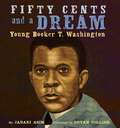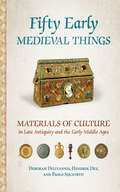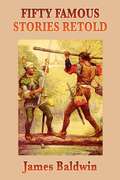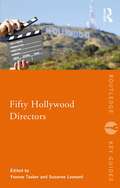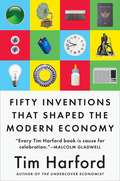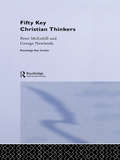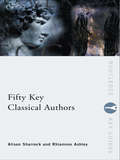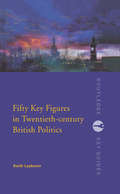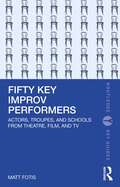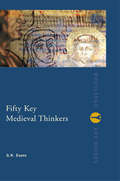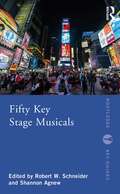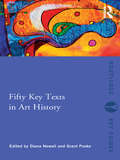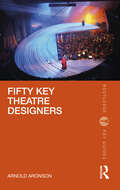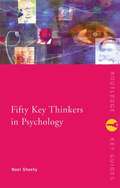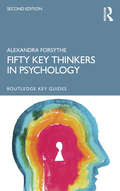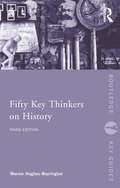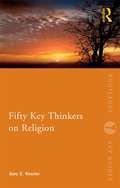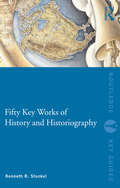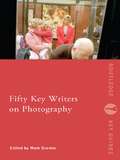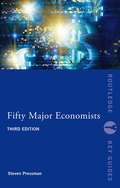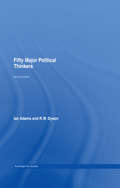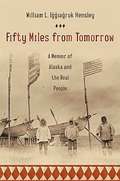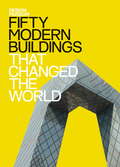- Table View
- List View
Fifty Cents and a Dream
by Jabari Asim Bryan CollierBooker dreamed of making friends with words, setting free the secrets that lived in books. Born into slavery, young Booker T. Washington could only dream of learning to read and write. After emancipation, Booker began a five-hundred-mile journey, mostly on foot, to Hampton Institute, taking his first of many steps towards a college degree. When he arrived, he had just fifty cents in his pocket and a dream about to come true. The young slave who once waited outside of the schoolhouse would one day become a legendary educator of freedmen. Award-winning artist Bryan Collier captures the hardship and the spirit of one of the most inspiring figures in American history, bringing to life Booker T. Washington's journey to learn, to read, and to realize a dream.
Fifty Classic British Films, 1932-1982: A Pictorial Record
by Anthony Slide200 striking photographs, in-depth commentaries, plot synposes, contemporary reviews, and more -- about 50 British classics from yesterday and today. Preface. Text. Alphabetical list of films. Bibliography.
Fifty Early Medieval Things: Materials of Culture in Late Antiquity and the Early Middle Ages
by Paolo Squatriti Deborah Deliyannis Hendrik DeyFifty Early Medieval Things introduces readers to the material culture of late antique and early medieval Europe, north Africa, and western Asia. Ranging from Iran to Ireland and from Sweden to Tunisia, Deborah Deliyannis, Hendrik Dey, and Paolo Squatriti present fifty objects—artifacts, structures, and archaeological features—created between the fourth and eleventh centuries, an ostensibly "Dark Age" whose cultural richness and complexity is often underappreciated. Each thing introduces important themes in the social, political, cultural, religious, and economic history of the postclassical era. Some of the things, like a simple ard (plow) unearthed in Germany, illustrate changing cultural and technological horizons in the immediate aftermath of Rome's collapse; others, like the Arabic coin found in a Viking burial mound, indicate the interconnectedness of cultures in this period. Objects such as the Book of Kells and the palace-city of Anjar in present-day Jordan represent significant artistic and cultural achievements; more quotidian items (a bone comb, an oil lamp, a handful of chestnuts) belong to the material culture of everyday life. In their thing-by-thing descriptions, the authors connect each object to both specific local conditions and to the broader influences that shaped the first millennium AD, and also explore their use in modern scholarly interpretations, with suggestions for further reading. Lavishly illustrated and engagingly written, Fifty Early Medieval Things demonstrates how to read objects in ways that make the distant past understandable and approachable.
Fifty Famous Stories Retold
by James BaldwinJames Baldwin has collected fifty wonderful stories, including Robin Hood, William Tell, King Alfred and Julius Caesar. Your child will be delighted to hear or read these, and will not only be entertained, but will learn about history and folklore. These stories will also help lay the foundation for broader literary studies.
Fifty Hollywood Directors (Routledge Key Guides)
by Yvonne Tasker Suzanne LeonardFifty Hollywood Directors introduces the most important, iconic and influential filmmakers who worked in Hollywood between the end of the silent period and the birth of the blockbuster. By exploring the historical, cultural and technological contexts in which each director was working, this book traces the formative period in commercial cinema when directors went from pioneers to industry heavyweights. Each entry discusses a director’s practices and body of work and features a brief biography and suggestions for further reading. Entries include: Frank Capra Cecil B DeMille John Ford Alfred Hitchcock Fritz Lang Orson Welles DW Griffith King Vidor This is an indispensible guide for anyone interested in film history, Hollywood and the development of the role of the director.
Fifty Inventions That Shaped the Modern Economy
by Tim HarfordA lively history seen through the fifty inventions that shaped it most profoundly, by the bestselling author of The Undercover Economist and Messy. Who thought up paper money? What was the secret element that made the Gutenberg printing press possible? And what is the connection between The Da Vinci Code and the collapse of Lehman Brothers? Fifty Inventions That Shaped the Modern Economy paints an epic picture of change in an intimate way by telling the stories of the tools, people, and ideas that had far-reaching consequences for all of us. From the plough to artificial intelligence, from Gillette’s disposable razor to IKEA’s Billy bookcase, bestselling author and Financial Times columnist Tim Harford recounts each invention’s own curious, surprising, and memorable story. Invention by invention, Harford reflects on how we got here and where we might go next. He lays bare often unexpected connections: how the bar code undermined family corner stores, and why the gramophone widened inequality. In the process, he introduces characters who developed some of these inventions, profited from them, and were ruined by them, as he traces the principles that helped explain their transformative effects. The result is a wise and witty book of history, economics, and biography.
Fifty Key Christian Thinkers (Routledge Key Guides)
by George Newlands Peter McEnhillFifty Key Christian Thinkers provides both valuable information and stimulating debate on the lives and work of fifty of the most important Christian theologians. This guide provides an overview of Christian theology from the emergence of the faith 2000 years ago to the present day. Among the figures profiled in this accessible guide are:* St Paul * Barth * Aquinas * Boethius* Niebuhr * Calvin* Luther * Feuerbach* Kierkegaard * Origen
Fifty Key Classical Authors (Routledge Key Guides)
by Alison Sharrock Rhiannon AshleyA chronological guide to influential Greek and Roman writers, Fifty Key Classical Authors is an invaluable introduction to the literature, philosophy and history of the ancient world. Including essays on Sappho, Polybius and Lucan, as well as on major figures such as Homer, Plato, Catullus and Cicero, this book is a vital tool for all students of classical civilization.
Fifty Key Figures in Twentieth Century British Politics (Routledge Key Guides)
by Keith LaybornThis guidebook provides a complete overview of the lives and influence of fifty major figures in modern British political history. Reflecting the changes within British society and politics over the past century, the entries chart the development of key contemporary issues such as women's rights, immigration and the emergence of New Labour. Figures covered include:* Winston Churchill* Tony Blair* Emmeline Pankhurst* David Lloyd George* Margaret Thatcher* John Maynard Keynes* Enoch Powell* Barbara CastleWith cross-referenced entries and helpful suggestions for further reading, this book is an essential guide for all those with an interest in understanding the dominating issues of modern British politics.
Fifty Key Improv Performers: Actors, Troupes, and Schools from Theatre, Film, and TV (Routledge Key Guides)
by Matt FotisFifty Key Improv Performers highlights the history, development, and impact of improvisational theatre by highlighting not just key performers, but institutions, training centers, and movements to demonstrate the ways improv has shaped contemporary performance both onstage and onscreen. The book features the luminaries of improv, like Viola Spolin, Keith Johnstone, and Mick Napier, while also featuring many of the less well‑known figures in improvisation who have fundamentally changed the way we make and view comedy – people like Susan Messing, Jonathan Pitts, Robert Gravel, and Yvon Leduc. Due to improv’s highly collaborative nature, the book features many of the art form’s most important theatres and groups, such as The Second City, TJ & Dave, and Oui Be Negroes. While the book focuses on the development of improvisation in the United States, it features several entries about the development of improv around the globe. Students of Improvisational Theatre, History of Comedy, and Performance Studies, as well as practitioners of comedy, will benefit from the wide expanse of performers, groups, and institutions throughout the book.
Fifty Key Medieval Thinkers (Routledge Key Guides)
by G.R. EvansFocussing on individuals whose ideas shaped intellectual life between 400 and 1500, Fifty Key Medieval Thinkers is an accessible introduction to those religious, philosophical and political concepts central to the medieval worldview. Including such diverse figures as Bede and Wyclif, each entry presents a biographical outline, a list of works and a summary of their main theories, alongside suggestions for further reading. Chronologically arranged, and with an introductory essay which presents important themes in context, this volume is an invaluable reference tool for all students of Medieval Europe.
Fifty Key Stage Musicals (Routledge Key Guides)
by Robert W. SchneiderThis volume in the Routledge Key Guides series provides a round-up of the fifty musicals whose creations were seminal in altering the landscape of musical theater discourse in the English-speaking world. Each entry summarises a show, including a full synopsis, discussion of the creators' process, show's critical reception, and its impact on the landscape of musical theater. This is the ideal primer for students of musical theater – its performance, history, and place in the modern theatrical world – as well as fans and lovers of musicals.
Fifty Key Texts in Art History (Routledge Key Guides)
by Diana Newall and Grant PookeFifty Key Texts in Art History is an anthology of critical commentaries selected from the classical period to the late modern. It explores some of the central and emerging themes, issues and debates within Art History as an increasingly expansive and globalised discipline. It features an international range of contributors , including art historians, artists, curators and gallerists. Arranged chronologically, each entry includes a bibliography for further reading and a key word index for easy reference. Text selections range across issues including artistic value, cultural identity, modernism, gender, psychoanalysis, photographic theory, poststructuralism and postcolonialism. Rozsika Parker and Griselda Pollock Old Mistresses, Women, Art & Ideology (1981) Victor Burgin’s The End of Art Theory: Criticism and Postmodernity (1986) Homi Bhabha The Location of Culture: Hybridity, Liminal Spaces and Borders (1994) Geeta Kapur When was Modernism in Indian Art? (1995) Judith Butler's Gender Trouble (1999) Georges Didi Huberman Confronting Images. Questioning the Ends of a Certain History of Art (2004)
Fifty Key Theatre Designers (Routledge Key Guides)
by Arnold AronsonFifty Key Theatre Designers looks at the history of theatrical scenography by examining the work and contributions of fifty ground-breaking set, costume, lighting, and projection designers since the Renaissance. Developments of scenic design are traced from the introduction of perspective painting to create illusionistic scenery in Renaissance Italy to the use of digital projection in the twenty-first century. The book also discusses important landmarks in the evolution of costume and lighting design, as well as the introduction of film and video technology to stage design. A broad range of work is explored, including opera, dance, Broadway and West End commercial theatre, avant-garde performance, and even Olympic spectacles. Each chapter features one designer, including basic biographical information and a discussion of that artist’s style, aesthetics, and contributions. Designers covered include Sebastiano Serlio, Ferdinando Bibiena, Richard Wagner, Adolphe Appia, and Edward Gordon Craig, amongst many other notable individuals. Each chapter also includes references to other significant designers with similar aesthetics or who made similarly important contributions to the development of that aspect of scenography. This book is ideal for undergraduates and graduates of scenography, theatrical design, and theatre history.
Fifty Key Thinkers in Psychology (Routledge Key Guides)
by Noel Sheehy Alexandra ForsytheFifty Key Thinkers in Psychology introduces the life, thought and work of some of the most influential figures who have shaped and developed modern psychology. It features accessibly written and fully cross-referenced entries on such figures as: Sigmund Freud, Noam Chomsky, Carl Jung, Ivan Pavlov, Jean Piaget, Anne Anastasi, Konrad Lorenz, Hans Eysenck and William James. This fascinating and informative guide is an invaluable resource for those studying, working in, or who simply want to find out more about psychology.
Fifty Key Thinkers in Psychology (Routledge Key Guides)
by Alexandra ForsytheThe new edition of Fifty Key Thinkers in Psychology introduces the life, thought, work and impact of some of the most influential figures who have shaped and developed modern psychology, considering a more diverse history of the discipline. The revised text includes new biographies, histories, and overviews of the work from scientists and scholars such as Alfred Alder, Isabel Briggs Myers, Katherine Cook Briggs and Karen Horney, as well as major re-writes of the works of Freud, Binet and Jung, and some of the more controversial characters such as Charles Galton and Hans Eysenck. Exploring the often overlooked but significant contributions of black, Jewish, and Eastern scholars to the discipline, this new edition looks to address the historically imbalanced focus of particular key thinkers and begin unpicking the impact that race and gender had on the direction and advancement of the field. The book covers the black psychology movement from George Herman Candy to Mamie Phipps Clark, and Kenneth Bancroft Clark, the enormous contribution of Chinese psychologist Jing Qicheng, and some of the many great psychologists whose families were part of the waves of Jewish emigration to the United States escaping oppression, persecution and economic hardship, including Walter Mischel, Cary Cooper and Daniel Kahneman. This fascinating and informative guide is an invaluable resource for those studying, working in, or who simply want to find out more about psychology, suitable for both students and the lay reader alike.
Fifty Key Thinkers on History (Routledge Key Guides)
by Marnie Hughes-WarringtonFifty Key Thinkers on History is an essential guide to the most influential historians, theorists and philosophers of history. The entries offer comprehensive coverage of the long history of historiography ranging from ancient China, Greece and Rome, through the Middle Ages to the contemporary world. This third edition has been updated throughout and features new entries on Machiavelli, Ranajit Guha, William McNeil and Niall Ferguson. Other thinkers who are introduced include: Herodotus Bede Ibn Khaldun E. H. Carr Fernand Braudel Eric Hobsbawm Michel Foucault Edward Gibbon Each clear and concise essay offers a brief biographical introduction; a summary and discussion of each thinker’s approach to history and how others have engaged with it; a list of their major works and a list of resources for further study.
Fifty Key Thinkers on Religion (Routledge Key Guides)
by Gary KesslerFifty Key Thinkers on Religion is an accessible guide to the most important and widely studied theorists on religion of the last 300 years. Arranged chronologically, the book explores the lives, works and ideas of key writers across a truly interdisciplinary range, from sociologists to psychologists. Thinkers covered include: Friedrich Nietzsche James Frazer Sigmund Freud Emile Durkheim Ludwig Wittgenstein Mary Douglas Talal Asad Søren Kierkegaard Providing an indispensable one volume map of our understanding of religion in the west, the book is fully cross-referenced throughout and provides authoritative guides to important primary and secondary texts for students wishing to take their studies further.
Fifty Key Works of History and Historiography (Routledge Key Guides)
by Kenneth R. StunkelFifty Key Works of History and Historiography introduces some of the most important works ever written by those who have sought to understand, capture, query and interpret the past. The works covered include texts from ancient times to the present day and from different cultural traditions ensuring a wide variety of schools, methods and ideas are introduced. Each of the fifty texts represents at least one of six broad categories: early examples of historiography (e.g. Herodotus and Augustine) non-western works (e.g. Shaddad and Fukuzawa) ‘Critical’ historiography (e.g. Mabillon and Ranke) history of minorities, neglected groups or subjects (e.g. Said and Needham) broad sweeps of history (e.g. Mumford and Hofstadter) problematic or unconventional historiography (e.g. Foucault and White). Each of the key works is introduced in a short essay written in a lively and engaging style which provides the ideal preparation for reading the text itself. Complete with a substantial introduction to the field, this book is the perfect starting point for anyone new to the study of history or historiography.
Fifty Key Writers on Photography: Fifty Key Writers On Photography (Routledge Key Guides)
by Mark DurdenA clear and concise survey of some of the most significant writers on photography who have played a major part in defining and influencing our understanding of the medium. It provides a succinct overview of writing on photography from a diverse range of disciplines and perspectives and examines the shifting perception of the medium over the course of its 170 year history. Key writers discussed include: Roland Barthes Susan Sontag Jacques Derrida Henri Cartier-Bresson Geoffrey Batchen Fully cross-referenced and in an A-Z format, this is an accessible and engaging introductory guide.
Fifty Major Economists: Fifty Major Economists (Routledge Key Guides)
by Steven PressmanAn introduction to the life, work and ideas of the people who have shaped the economic landscape from the sixteenth century to the present day. Now in a third edition, it considers how major economists might have viewed challenges such as the continuing economic slump, high unemployment and the sovereign debt problems which face the world today, it includes entries on: • Paul Krugman • Hyman Minsky • John Maynard Keynes • Adam Smith • Irving Fisher • James Buchanan Fifty Major Economists contains brief biographical information on each featured economist and an explanation of their major contributions to economics, along with simple illustrations of their ideas. With reference to the recent work of living economists, guides to the best of recent scholarship and a glossary of terms, Fifty Major Economists is an ideal resource for students of economics. Steven Pressman is Professor of Economics and Finance at Monmouth University. He has published around 120 articles in refereed journals and as book chapters, and has authored, or edited 13 books, including Women in the Age of Economic Transformation, Economics and Its Discontents, Alternative Theories of the State, and Leading Contemporary Economists.
Fifty Major Political Thinkers (Routledge Key Guides)
by R. W. Dyson Ian AdamsFifty Major Political Thinkers introduces the lives and ideas of some of the most influential figures in Western political thought, from ancient Greece to the present day. The entries provide a fascinating introduction to the major figures and schools of thought that have shaped contemporary politics, including: Aristotle Simone de Beauvoir Michel Foucault Mohandas Gandhi Jurgen Habermas Machiavelli Karl Marx Thomas Paine Jean-Jacques Rousseau Mary Wollstonecraft. Fully cross-referenced and including a glossary of theoretical terms, this wide-ranging and accessible book is essential reading for anyone with an interest in the evolution and history of contemporary political thought.
Fifty Miles from Tomorrow: A Memoir of Alaska and the Real People
by William L. Iggiagruk HensleyIn "Fifty Miles from Tomorrow," Hensley offers us the rare chance to immerse ourselves in a firsthand account of growing up Native Alaskan. There have been books written about Alaska, but they've been written by Outsiders, settlers. Hensley's memoir of life on the tundra offers an entirely new perspective, and his stories are captivating, as is his account of his devotion to the Alaska Native land claims movement. As a young man, Hensley was sent by missionaries to the Lower Forty-eight so he could pursue an education. While studying there, he discovered that the land Native Alaskans had occupied and, to all intents and purposes, owned for millennia was being snatched away from them. Hensley decided to fight back. In 1971, after years of Hensley's tireless lobbying, the United States government set aside 44 million acres and nearly $1 billion for use by Alaska's native peoples. Unlike their relatives to the south, the Alaskan peoples would be able to take charge of their economic and political destiny. The landmark decision did not come overnight and was certainly not the making of any one person. But it was Hensley who gave voice to the cause and made it real.
Fifty Modern Buildings That Changed the World: Design Museum Fifty (Design Museum Fifty)
by Deyan Sudjic Design Museum Enterprise LimitedThe history of modern architecture is as diverse as it is beautiful, varying wildly from region to region and era to era. Here Deyan Sudjic, Director of the Design Museum, explores 50 of the most significant and striking buildings in the world, from the modernist aesthetic of Le Corbusier's Villa Savoye to the eye-catching flair of Beijing's CCTV Headquarters. Contents include:Villa Savoye, PoissyRockefeller Center, New YorkEames House, Los AngelesMontreal Biosphere, MontrealPompidou Centre, ParisGuggenheim Museum, BilbaoBeijing Olympic Stadium, BeijingSelfridges, Birmingham...and many more.
Fifty More Places to Play Golf Before You Die: Golf Experts Share the World's Greatest Destinations (Fifty Places)
by Chris SantellaA stunning, in-depth guide to fifty more of the world&’s greatest golf courses, selected by people deeply connected to the sport. With this follow-up to his bestselling Fifty Places to Play Golf Before You Die, Chris Santella interviews fifty luminaries in the golf world to uncover some of the sport&’s hidden gems. Golf industry insiders—from seasoned touring professionals (Amy Alcott, Fred Funk) to journalists and photographers (James Dodson, Brian Morgan) to golf course architects (Robert von Hagge, Bob Harrison) to travel specialists (Gordon Dalgleish, Mike Lardner)—offer their favorite courses around the world and describe what makes them so spectacular. Their experiences bring the venues to life for both ardent golfers and armchair travelers. The golf courses featured here range from the windswept peninsula of Old Head off the coast of Ireland to the sultry landscape of the recently inaugurated Ho Chi Minh Golf Trail in Vietnam to the privileged putting surfaces of California&’s Cypress Point and Maryland&’s Congressional Country Club. Along the way, Santella shares vivid descriptions of the courses, funny and touching anecdotes, and enough &“If You Go&” information for golfers to begin planning that once-in-a-lifetime getaway. The texts are complemented by more than forty vivid photographs that capture the allure of these unforgettable golf destinations.
